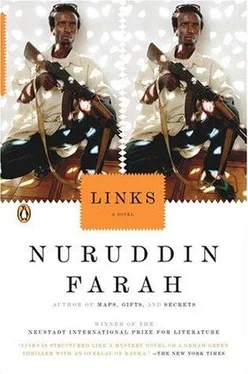“When I think about America from the perspective of a Somali, and reflect on what’s occurred following the U.S. intervention, then I feel I’m in a bind.”
Dajaal took a tighter grip on the ball he kept squeezing to help the blood in his hand circulate. You could see that he too was turning a thought in his head, stirring it, agitating it.
“Something happened that I hadn’t reckoned on,” Jeebleh said. “I discovered that I was not saddened by the deaths on either side as much as I was saddened by the ruthlessness displayed by the young fighters.” He watched the flight of an eagle briefly before turning to Dajaal to ask, “What did you think of the Marines and the Rangers as fighters?”
“I couldn’t fault the junior officers.”
“What about the commanding officers?”
Dajaal took an even firmer grip on the rubber ball, his knuckles protruding more prominently and appeared a shade paler than their natural color.
“My heart went out to the young Marines and Rangers,” Dajaal said, “even though on the night of the third of October, when I confronted them — man to man — I gave each of them as much of a piece of hell as I could. But during the lull in the fighting, I felt as though each of them was alone in his fear, like a child left in the pitch-darkness of a strange room by parents who were enjoying themselves elsewhere. I imagined them wondering what they were doing in Africa, away from their loved ones, and asking themselves why some skinny Somalis in sarongs were taking potshots at them. I imagined them questioning in their own minds the explanations put out by military spokesmen at Pentagon briefings. But you want to know what I thought of the commanding officers. From the majors upward, including the AIC?”
“Tell me.”
“I hoped to God they would be court-martialed, and wished them hell and much worse.” Dajaal squeezed the ball as though he might eventually succeed in getting blood out of it. “The senior officers were too ignorant to learn, too arrogant. If only they had had enough humility to put themselves in their subordinates’ shoes, I kept thinking. Their behavior was loony. But the young Marines and Rangers redeemed themselves with their fighting. They held up well, fought fiercely, and gave back as good as they got. As fighters, there was a major flaw in their character, however. They thought less of us, and that was ultimately the cause of their downfall. You should never think less of your opponent — we were taught this at military school. If you respect your enemy, you can be easier on yourself later, especially if you lose the fight, and it is of high moral value when you win.”
“They belittled StrongmanSouth’s militia?”
“They belittled all of us, fighters or no fighters,” Dajaal corrected him. “StrongmanSouth didn’t fight. I was there, and he didn’t fight. That was to prove the Americans’ undoing, the fact that they belittled the fighters.”
“You’re saying that pride can cause one’s ruin?”
“A lot of terrible things were done that night and the following morning by both groups, ours and theirs,” Dajaal said, “all in the service of the raging insanity. We had hardly wised up to what was being done on our side when we witnessed the worst imaginable horror in the shameful shape of youths dragging a dead American down the city’s dusty roads. But then I thought, A mob is a mob, and there’s nothing you can do about it. Mobs run riot, they are good at that: if they go mad, they do it everywhere, even in America.”
“Was there any way someone could’ve prevented it?”
“It all happened so fast,” Dajaal said, “we couldn’t have done anything, even if we had wanted to. We were aware of the mob gathering, chanting the usual anti-American slogans. Then, before you could say, ‘Please, let’s not do that,’ the youths, mostly urchins and riffraff, were rampaging, my grandson Qasiir among them. No one was in control. Many of us were too exhausted from the nightlong fighting and couldn’t be bothered. You must remember, there were so many deaths on our side, over a thousand by our reckoning. Many of us went straight from the fighting to the burial grounds. We were all out on a limb for all of thirteen hours or so, fighting to keep death at bay, and I doubt if we could’ve raised our voices against what the youths were doing. I can assure you that we were shocked. Were you not shocked?”
Jeebleh remembered seeing the scene on TV. He had thought of beasts of prey roaming the streets of the city and the countryside, beasts inhabiting the minds of the youths. But when answering Dajaal’s question, he moderated his reaction. “I thought of life-in-death, if that makes sense to you.”
“The mob had hardly dispersed,” Dajaal continued, “and we heard on our short-wave radio that the Americans were leaving, body bags and all. Some of us would’ve liked to talk things through. I’m sorry that wasn’t to be.”
“StrongmanSouth wouldn’t have wanted to talk?”
“Of course he wouldn’t.”
“Why not?”
“Because he was a spent force until the AIC gave him a new lease on life by making him ‘Wanted’ and placing a reward worth thousands of dollars on his head,” Dajaal said. “Thanks, but no, thanks, to the AIC!”
Jeebleh remembered the discussion of the previous night, and he asked Dajaal to tell him who, in his opinion, had fought whom. “Americans versus Somalis?”
Dajaal explained that the Somalis, fragmented in their sectarian loyalties, did not see the battle as having been fought between “Somalis” and “Americans.” “The fighting was between the clansmen supporting StrongmanSouth, and the AIC,” he said. “Truth was one of the first casualties of the war.”
“Did you see yourself as a man provoked into deadly action? What finally made you decide to dig up your gun? Were you in a rage?”
“Anger had nothing to do with it,” Dajaal replied, “but justice did.”
“Were you afraid?”
“I was prone to fear, like the Marines, and alone in my fear too. But I wasn’t in a strange country, I knew why I was doing what I was doing, and I knew where I was, even in the dark! That was the difference between our situation and that of the young Americans.”
They came across a zinc wall on which someone had scrawled “Dal-dalo maidkaada, tagna!” Jeebleh rendered this to himself as “Take away your corpses and leave our country!” He knew where the line came from. His memory galloping, he recited lines from a poem composed at the turn of the twentieth century by Somalia’s greatest poet, Sayyid Mohammed Abdulle Hassan.
“I have no cultivated fields, or silver
Or gold for you to take!
The Country is bush.
If you want wood and stone,
You can get them in plenty,
There are also many termite hills.
All you can get from me is War.
If you want peace, go away from my Country.”
Then a silence, which neither was prepared to break, came between them, like a referee stopping a fight. And into the silence walked a rabble of armed youths, like extras in a film about Mexican bandidos. As though on cue, one youth came forward. He was very short, stocky, and showily dressed as an outlaw — boots, bandanna, and Stetson hat. You could see that he was the kind who would waste you without blinking an eyelid. Jeebleh was expecting to hear a crescendo of gunshots, and death calling, when his worried gaze settled on Dajaal’s nonchalant expression. The youth shouted, “Nothing to worry about, Grandpa. We’re just having some fun, me and my friends!”
“Come and I’ll introduce you to my visiting friend, then,” Dajaal told the youth. He turned to Jeebleh and said sotto voce, “He’s my grandson, whom everyone calls Qasiir. A rascal, really. He can tell you how he partook of the fighting on the day his sister was hurt. He has been involved in a lot of tomfoolery too.”
Читать дальше












